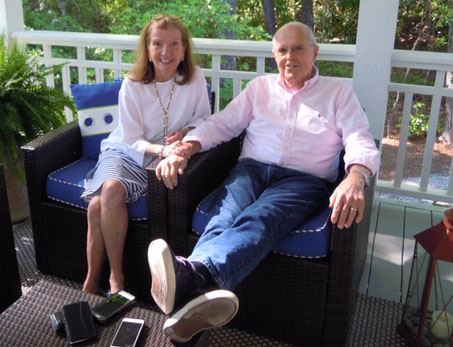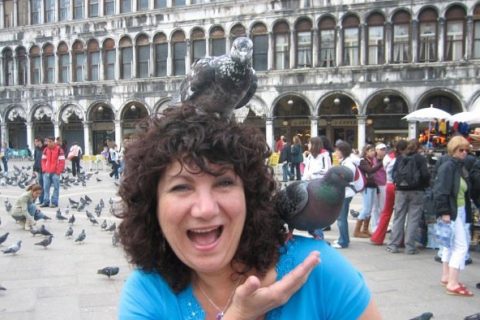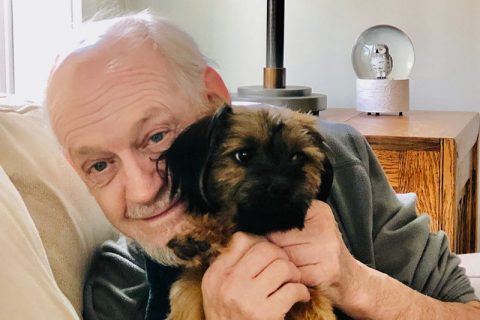Mesothelioma Survivor Takes a Stand Against Her Cancer


Fact Checked | Written by: Tim Povtak | Last Update: 10/23/2024
Susan Dickman was told more than once that aggressive cytoreductive surgery, which could last up to 12 hours, might be too risky for her age and stage of disease.
They advised her to take a more palliative, quality-of-life approach to the grim diagnosis of peritoneal mesothelioma, a rare and aggressive cancer related to asbestos.
She refused to listen. And slammed the door.
Thank goodness.
Susan will celebrate her 80th birthday on Sept. 2, more than seven years after undergoing the difficult mesothelioma surgery that has given her new life, and a chance to inspire others with her determination.
“I had a strong will to live. And still do,” she said from her home in North Carolina. “When we were looking at our options, I had a doctor say, ‘If it was me, I wouldn’t go through the surgery. It’s too much.’ And right after, we had another doctor say he still wouldn’t have done it.”
Susan has proven them all wrong.
Life today comes with no restrictions — and no sign of tumor recurrence.
Living Life to the Fullest
She is packing boxes for her move in October to a new home. She walks daily. She plays croquet at the local club. She does yoga. She works out at a gym.
And she sings the praises of Wake Forest Medical Center specialist Dr. Edward Levine, who performed the extensive surgery when others would not.
“Even he told me, he usually doesn’t do this kind of operation beyond age 70. (She was 72 at the time),” Susan said. “But I told him I was younger than my years. And he agreed.”
She prepared for the surgery in June 2012 by building her stamina with aerobic workouts and weights. She consulted a cardiologist who guaranteed her heart could withstand it.
The 11-hour surgery removed cancerous growth from multiple sites throughout her abdominal cavity. Levine removed her spleen, gall bladder, appendix, omentum, reproductive organs and parts of her liver.
That aggressive treatment was immediately followed by hyperthermic intraperitoneal chemotherapy (HIPEC), a heated solution circulated throughout the abdomen for 90 minutes that kills any cancer cells in the abdominal cavity.
“The surgery is barbaric when you think about it,” Susan said. “How the body recovers from all that, I don’t know. He told me earlier that I’d wake up and feel like I’d been run over by a truck. And he was right. It’s a tough recovery.”
Difficult Recovery Was Worth It
She spent six days in the hospital and another week close to the hospital for regular check-ins. The four-hour drive home later that month felt like four days. It took almost a year before she felt mentally and physically whole again.
“I was loopy for almost a year, very forgetful. My brain wasn’t sharp and that scared me,” Susan said. “But the whole time I felt like I was going to beat this, and that I just wasn’t ready to die. I’m a survivor, and hopefully, I continue to be one.”
At first, she returned to see Levine every three months, then every six months, and then every year. He has now moved back the checkups to every two years.
“I won’t see him again until 2020. In a way, it’s like losing your anchor, a little scary,” Susan said. “I don’t know if that means I’m out of the woods. I don’t ask. Every time he sees me, though, he smiles and says, ‘What a beautiful scar you have.’ He also told me I would be a really old woman before I die.”
Survivor Credits Support and Prayer
Beyond Levine, Susan gives credit to multiple sources for her postsurgery comeback, and her ability to beat the odds and become an inspirational, long-term mesothelioma survivor.
Her husband, Wes Dickman, became her full-time caregiver through much of the first postsurgery year. He never wavered.
A support group of close friends and family made sure Susan had everything she could possibly need, providing emotional and physical help.
So many neighbors were bringing dinner and offering encouragement each day that Wes finally sent a text to everyone, asking for the food delivery to stop. He was eating way too much to avoid wasting food.
Susan had no postsurgery appetite, dropping to a risky 88 pounds. Unplanned weight loss after surgery can complicate recovery.
He also posted a “No Visitors” sign on the front door when Susan became overwhelmed by all the well-wishers. They laugh about that now.
The power of prayer became invaluable, too.
“I had hundreds of people praying for me,” she said. “Believe me, prayer does work. There is no doubt about that. Even if you’re an atheist, I’d advise every patient to find a prayer group. Prayer, and a great surgeon, can work wonders.”
Strong Enough to Become Husband’s Caregiver
Also proving invaluable was Sugar, the couple’s loyal golden retriever, who rarely left her side in those first six months. Sugar provided the silent, emotional support that Susan needed.
“Sugar was incredible, following me everywhere. She made me believe in therapy dogs,” she said. “I may be nuts, but I think animals can bring you lots of comfort when you need it.”
She became her normal, high-energy self after that first postsurgery year. She even became her husband’s caregiver for much of 2018 when he waged his own battle with lymphoma, which severely tested the family again.
He, too, is a survivor today.
They will celebrate her 80th birthday throughout Labor Day weekend. Sons Mike and Chris, who live in South Florida and Buffalo, New York, respectively, will be bringing their families for the occasion.
Her sister and her children, along with several close family friends, will also be there to sing happy birthday for three consecutive days.
“I feel lucky, blessed and fortunate to be here today,” Susan said. “We’re going to really celebrate this one all weekend, but my goal is still to make it to 90.”






